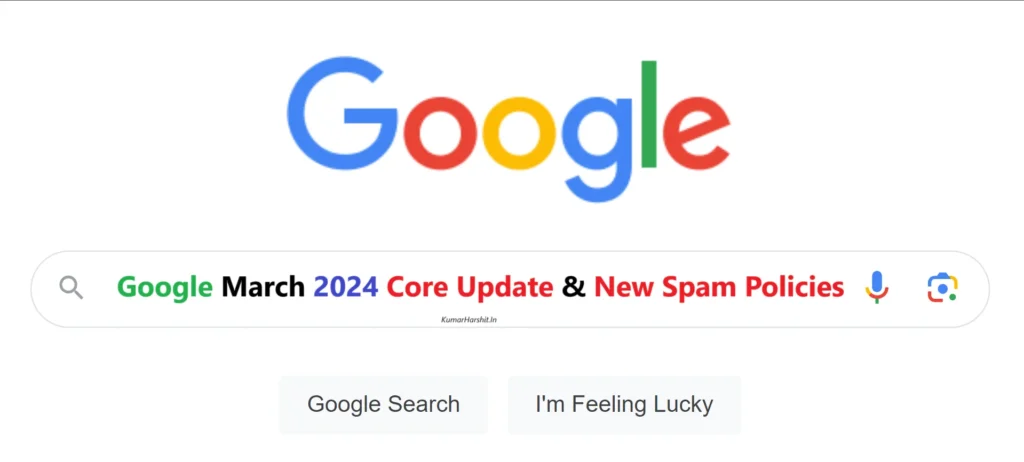Google March 2024 Core Update & New Spam Policies

Update on Tuesday, March 5, 2024, by Google Search Central

In a significant development, Google has unveiled its highly anticipated March 2024 core update alongside new spam policies, aiming to refine search quality and combat spammy practices that undermine user experience. These updates mark a pivotal moment in the evolution of search algorithms and policies, shaping the digital landscape for creators and users alike. Let’s delve deeper into the intricacies of these transformative changes and their implications for web creators.
March 2024 Core Update
The March 2024 core update represents a sophisticated refinement of Google’s search algorithms, incorporating nuanced adjustments across multiple core systems. Unlike routine updates, this iteration heralds an evolution in the evaluation of content helpfulness, prioritizing relevance and usefulness in search results. This multifaceted approach reflects Google’s commitment to providing users with high-quality, informative content that meets their search intent.
This update introduces a paradigm shift in how content is assessed, moving away from traditional signals towards a holistic evaluation framework. The integration of innovative signals and methodologies underscores Google’s pursuit of a more refined and intuitive search experience. However, the complexity of this update necessitates a gradual rollout, potentially resulting in fluctuations in search rankings as algorithms recalibrate and adapt to new parameters.

For creators, adherence to established content quality guidelines remains paramount. Crafting content that resonates with users and fulfills their informational needs is key to maintaining visibility and relevance in search results. While no specific actions are mandated for this update, creators are encouraged to leverage Google’s guidance on creating compelling, user-centric content to optimize their digital presence.
New Spam Policies
In tandem with the core update, Google has introduced three new spam policies designed to address emerging trends in spammy practices: expired domain abuse, scaled content abuse, and site reputation abuse. These policies target manipulative tactics aimed at artificially inflating search rankings, thereby compromising the integrity of search results.
Expired Domain Abuse
Expired domain abuse involves repurposing expired domains to host low-value content, exploiting the reputation of the domain to gain visibility in search results. Expired domain abuse occurs when individuals purchase expired domain names and repurpose them primarily to manipulate search rankings. For instance, someone might acquire a domain previously used by a reputable medical site and repurpose it to host low-quality casino-related content. By leveraging the domain’s prior reputation, they aim to achieve higher rankings in search results. These domains are typically intended to be discovered only through search engines, and their content offers little to no value to users. However, it’s acceptable to use an old domain name for a new, original site designed to serve users’ needs.
Scaled Content Abuse
Scaled content abuse encompasses the mass production of unoriginal, low-quality content, devoid of substantive value to users. Scaled content abuse involves generating numerous pages primarily to manipulate search rankings without providing value to users. This practice focuses on creating large volumes of unoriginal content that fails to benefit users, regardless of how it’s produced. The abusive nature of scaled content creation extends beyond automated processes to include human efforts or combinations thereof. Google aims to address this issue by taking action against websites engaged in scaled content abuse, regardless of the method used to produce the content.
Site Reputation Abuse
Site Reputation Abuse entails leveraging third-party pages to manipulate search signals, undermining the credibility and relevance of search results. Site reputation abuse occurs when third-party pages are published with little to no oversight or involvement from the host site. These pages exploit the host site’s ranking signals to manipulate search rankings. Examples of such third-party pages include sponsored, advertising, or partner content that lacks meaningful oversight or relevance to the host site’s primary purpose. Google’s new policy targets content hosted without close oversight and intended solely to manipulate search rankings. While not all third-party content is considered a violation, content creators must ensure transparency and relevance to avoid violating Google’s spam policies.
Creators are urged to familiarize themselves with these policies and ensure compliance to avoid penalties and potential ranking demotions. Upholding content integrity and user satisfaction are pivotal in navigating the evolving search landscape and safeguarding long-term digital success.
Looking Ahead: A Commitment to Excellence
As Google continues to refine its search algorithms and policies, the overarching goal remains unchanged: to deliver accurate, relevant, and authoritative content to users worldwide. The rollout of new spam policies underscores Google’s unwavering commitment to combatting spammy practices and elevating the quality of search results.
Creators and webmasters are encouraged to stay informed about these updates and leverage available resources to enhance their digital strategies. By prioritizing content quality, user engagement, and adherence to established guidelines, creators can foster meaningful connections with their audience and establish a lasting presence in the digital ecosystem.
What are the ranking signals that a site possesses?
Google’s core ranking systems primarily operate at the page level, utilizing a diverse array of signals and mechanisms to determine the ranking of individual pages. While page-level signals are predominant, some site-wide signals are also taken into consideration. It’s worth noting that certain third-party services may offer “reputation” or “authority” scores for websites, but these metrics do not align with Google’s own signals and are not endorsed by Google.
Is a coupon area on my site, produced in part by working with a third party, considered spam?
If your site hosts a coupon area produced in collaboration with a third party, it’s important to assess its compliance with Google’s guidelines. Many reputable publications include coupon sections for the benefit of their readers. As long as your website actively participates in curating the coupon area and ensures transparency regarding the sourcing of coupons, there is typically no need to restrict this content from appearing in Google Search results. However, it’s essential to clearly communicate to readers how the coupons are sourced and verify that they offer genuine value.
In Conclusion:
The March 2024 core update and new spam policies represent significant milestones in Google’s ongoing efforts to refine search quality and combat spam. Through collaborative engagement and adherence to best practices, creators and search engines can work synergistically to deliver a more enriching and fulfilling online experience for users worldwide. Click here to read all Latest Google Algorithm Updates 2024.
FAQ: March 2024 Core Update
The March 2024 core update aims to enhance the quality of search results by prioritizing content that is helpful and valuable to users. It seeks to reduce the prominence of content that is primarily designed to attract clicks rather than provide useful information.
Google has enhanced its core ranking systems to evaluate the helpfulness of content using a variety of innovative signals and approaches. Unlike previous updates, there is no single signal or system used to determine content helpfulness. The update marks an evolution in how Google identifies and prioritizes useful content.
Content creators are encouraged to continue producing high-quality, user-centric content. There are no specific actions required for the core update, as long as content is created with the intention of satisfying users’ needs and queries.
Google has introduced three new spam policies aimed at addressing practices that can negatively impact search results quality: expired domain abuse, scaled content abuse, and site reputation abuse.
Expired domain abuse involves repurposing expired domain names primarily to manipulate search rankings by hosting low-quality content. Google considers this practice detrimental to the integrity of search results and may penalize sites engaging in expired domain abuse.
Scaled content abuse refers to the creation of numerous pages intended to manipulate search rankings without providing value to users. This practice involves generating large amounts of unoriginal content solely for the purpose of improving search visibility.
Site reputation abuse occurs when third-party pages are published independently of the host site’s oversight to manipulate search rankings. Google’s new policy targets pages that exploit the ranking signals of host sites without adding value to users.
Site owners should review Google’s spam policies and ensure their content practices align with the guidelines. Violations of spam policies may result in lower search rankings or removal from search results. Site owners affected by spam manual actions can request a reconsideration through Google Search Console.
The new spam policies will take effect starting May 5, 2024. Site owners have time to adjust their content and practices to comply with the updated guidelines before the implementation date.
For additional details and updates regarding the March 2024 core update and new spam policies, users can refer to Google’s official announcements and resources available on the Google Search Central website.
Google’s approach to ranking helpful content has evolved since its initial launch in 2022. Currently, there isn’t a single system for identifying helpful content. Instead, multiple signals and systems are utilized.
Google provides a help page with questions to self-assess the helpfulness and reliability of content.
Google primarily assesses content on a page level, although some site-wide signals are also considered.
While Google primarily focuses on showing helpful content, having significant amounts of unhelpful content may impact the performance of other pages. Removing such content may contribute to improved performance.
Ranking changes can occur at any time due to various reasons. While Google regularly updates its core ranking systems, there’s no fixed timeline for potential improvements to reflect in rankings.


Leave a Reply